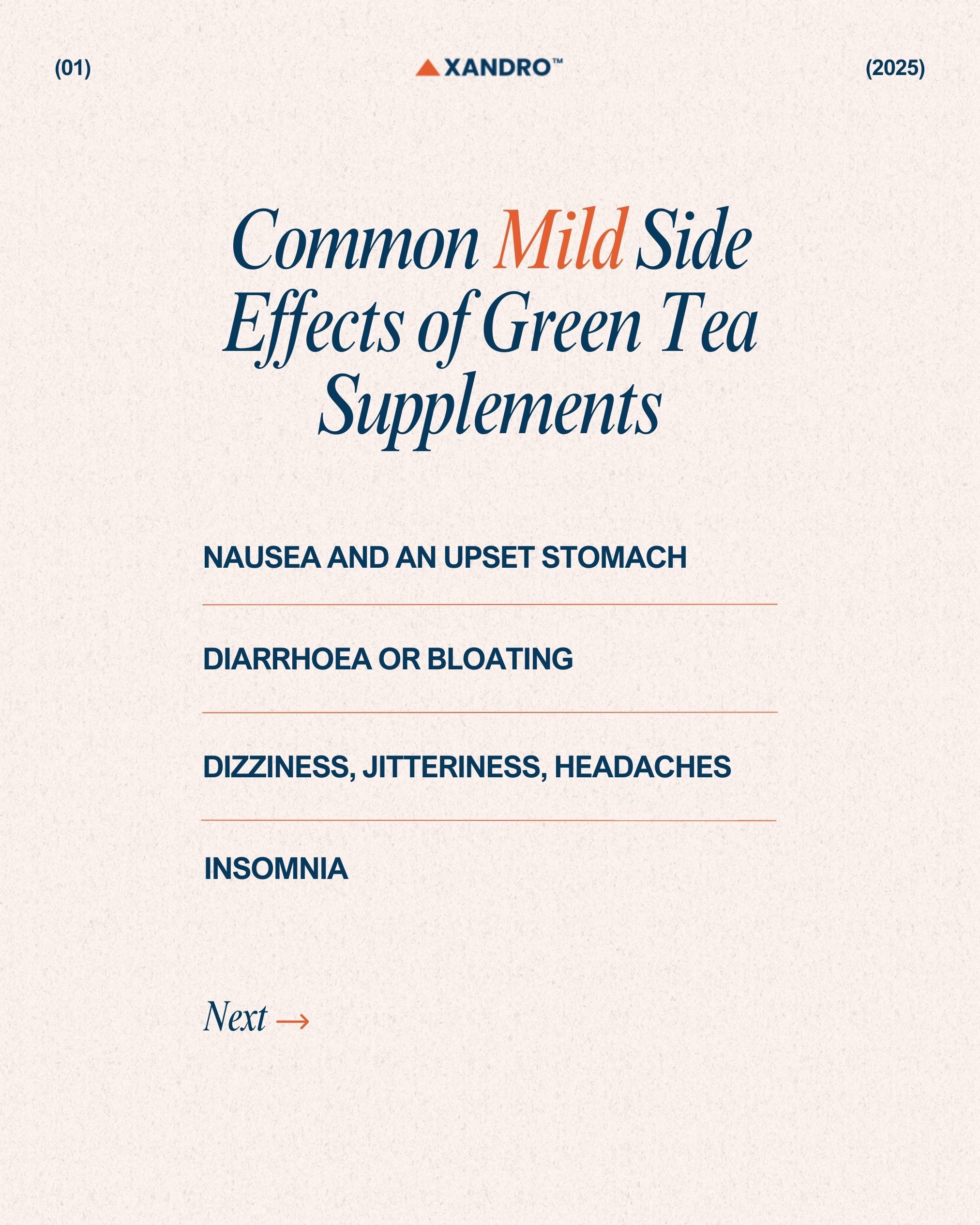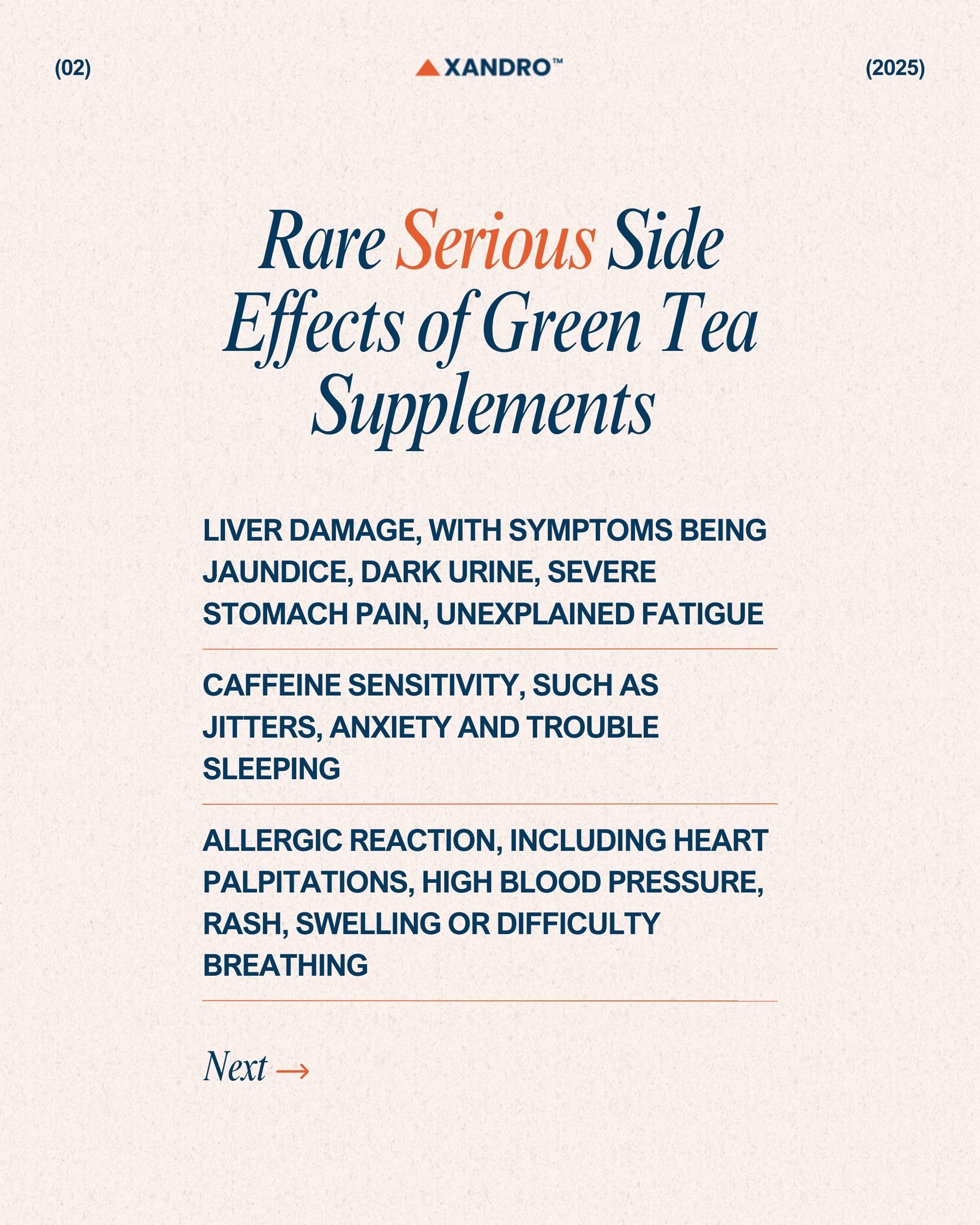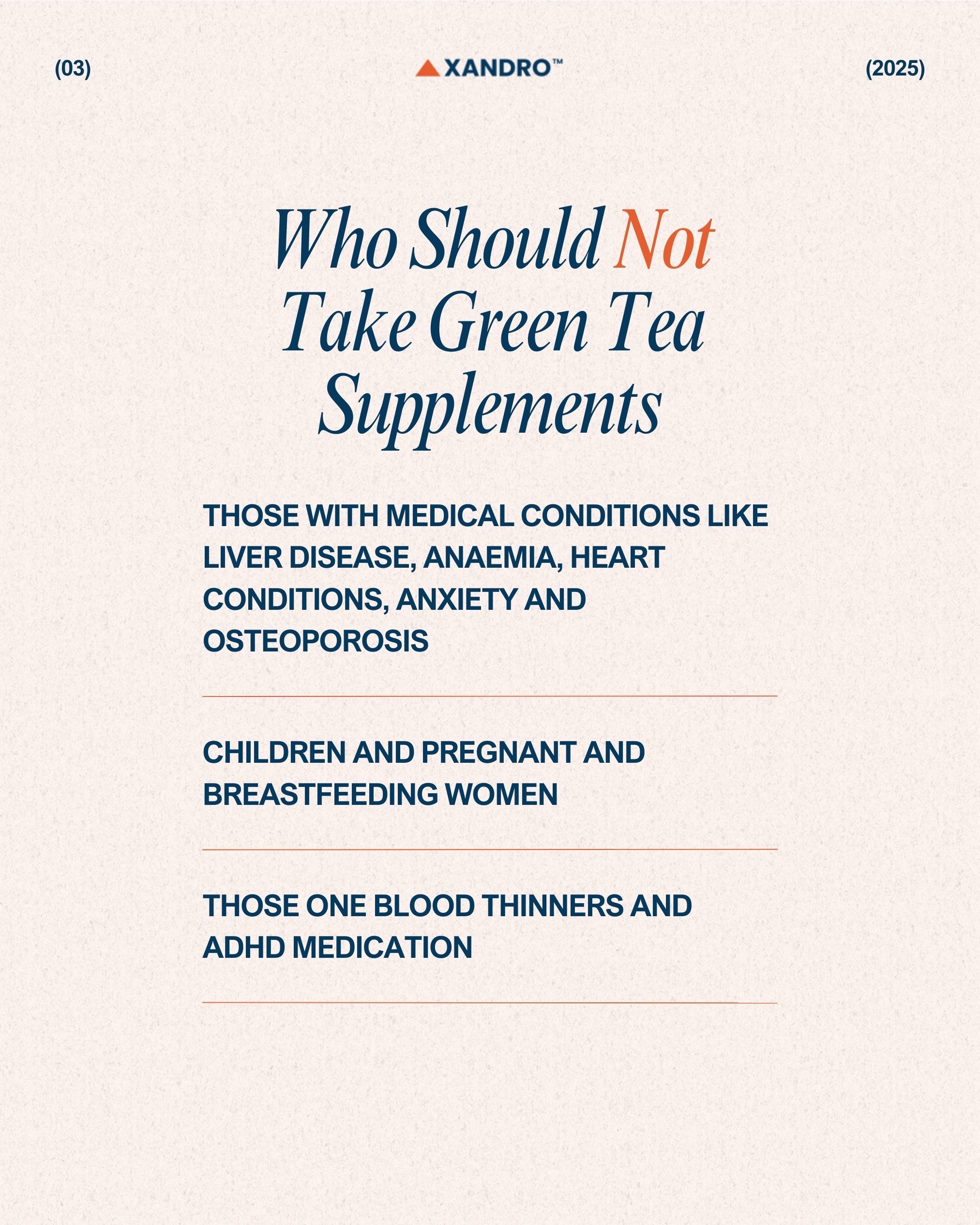Common Green Tea Extract Side Effects: Risks & Who Should Avoid
26th May 2025
Green Tea Extract Side Effects: What You Need to Know
Green tea extract is a popular supplement known for its potential health benefits. Some green tea benefits include better alertness, weight loss support, lower cholesterol, less risk of Parkinson’s and antioxidant properties.
Like any supplement, though, it can have side effects, especially when taken in high doses or by certain individuals.
Let’s go over what these green tea side effects — which are the same as EGCG side affects — are, as well as who should avoid taking it.
Further Reading: Side Effects of Common Supplements
Jump there now:
- What Are the Side Effects of Green Tea Extract?
- Who Should Not Use Green Tea Extract?
- Is It Okay to Take Green Tea Extract Every Day?
- Recommended Daily Limits of Green Tea
- Green Tea Side Effects for Females vs. Males
- Does Green Tea Extract Cause Liver Damage?
What Are the Side Effects of Green Tea Extract?
Green tea extract contains caffeine and is packed with antioxidants like EGCG (epigallocatechin gallate), which may help with weight loss, heart health and even cancer prevention. Just because it’s natural, however, doesn’t mean it’s completely harmless.
Some people experience side effects, especially if they take too much or have certain health conditions.
Common Mild Side Effects of Green Tea Supplement
- Nausea and upset stomach (especially when taken on an empty stomach)
- Diarrhoea or bloating
- Headaches (due to caffeine)
- Dizziness or jitteriness
- Insomnia (if taken too close to bedtime)

Serious Green Tea Extract Side Effects (Rare but Possible)
One of the biggest concerns is liver damage, though this is rare.
Most cases happen when people take very high doses of green tea extract supplements, much more than they’d get from drinking regular green tea. Symptoms include:
- Yellowing of skin/eyes (jaundice)
- Dark urine
- Severe stomach pain
- Unexplained fatigue
If you notice any of the above symptoms, stop taking the supplement and see a doctor right away.
Another issue is caffeine sensitivity. Green tea has less caffeine than coffee, but if you’re sensitive to stimulants, it can still cause jitters, anxiety, or trouble sleeping, especially if you take it at night. Some people also get headaches, nausea, or diarrhea, particularly if they take the extract on an empty stomach.
If you experience heart palpitations and high blood pressure, or an allergic reaction, such as a rash, swelling or difficulty breathing, stop taking the supplement and speak with your doctor immediately.
What about green tea tablets? The side effects of green tea tablets are the same as green tea extract, but you must be careful as some brands may pack in very high EGCG levels, so check the label.
Further Reading: Side Effects of Xandro Supplements

Who Should Not Use Green Tea Extract?
While green tea is generally safe for most people, certain individuals should avoid or limit its use, as not everyone reacts the same way to green tea extract.
Medical Conditions to Consider
- Liver disease: High doses may worsen liver function.
- Anaemia: Green tea (the tannins) can reduce iron absorption. To avoid this, don’t drink green tea with meals — wait at least an hour before or after eating.
- Heart conditions: Caffeine may cause irregular heartbeat and raise your heart rate.
- Anxiety disorders: Can worsen nervousness or tremors. It can even increase side effects of some antidepressants.
- Osteoporosis: May lower calcium levels over time.
Special Populations
- Pregnant/Breastfeeding Women: High caffeine intake may affect foetal development.
- Children: More sensitive to caffeine’s effects.
- People on blood thinners (like warfarin): Vitamin K in green tea may interfere with blood clotting.
- People with ADHD: If you’re on ADHD meds or energy pills, like Adderall, Ritalin or even energy drinks, this can make your heart race, raise your blood pressure and cause anxiety.

Is It Okay to Take Green Tea Extract Every Day?
If you take green tea extract every day (especially in high doses), your body might get used to the caffeine. If you then suddenly stop, you could have withdrawal symptoms like headaches, fatigue and irritability. To avoid this, try cutting back slowly instead of quitting all at once.
Moderate daily use is usually safe, but excessive intake (especially in supplement form) can lead to:
- Tolerance to caffeine (needing more for the same effect)
- Dependence (withdrawal symptoms if stopped suddenly)
- Potential liver strain (with high-dose EGCG)
What are the Withdrawal Symptoms of Green Tea Extract
If you suddenly stop taking green tea extract after long-term use, you may experience caffeine withdrawal, including:
- Headaches
- Fatigue
- Irritability
- Brain fog
As mentioned above, to avoid this, gradually reduce your dose instead of quitting cold turkey.
Recommended Daily Limits of Green Tea
|
Form |
Safe Daily Amount |
|
Green tea (brewed) |
3–5 cups (up to 400mg caffeine) |
|
Green tea extract (supplement) |
Follow label: usually ≤300–400mg EGCG |
Note: Supplements are more concentrated than brewed tea, increasing side effect risks.
Green Tea Side Effects for Females vs. Males
Most of the side effects of green tea are felt by both men and women, but there are a few considerations you may need to consider.
For Women
- Hormonal sensitivity: Some evidence suggests, caffeine may worsen PMS symptoms (irritability, cramps).
- Pregnancy risks: High caffeine intake may be linked to low birth weight.
- Iron deficiency: Tannins in tea can reduce iron absorption (a concern for menstruating women).
For Men
- Prostate health: Some studies suggest benefits, but excessive caffeine may affect sleep and testosterone.
Does Green Tea Extract Cause Liver Damage?
While rare, high doses of green tea extract (especially in supplements) may have a link to liver injury. If you believe you are experiencing green tea side effects on your liver, you may notice:
- Jaundice (yellow skin/eyes)
- Severe nausea/vomiting
- Abdominal pain
If this is you, stop using the supplement and speak with your doctor immediately. To reduce any risk, stick to moderate doses and avoid alcohol while taking green tea extract.
Further Reading: Calcium AKG and its Benefits for Bones, Liver and the Brain
End Note
Green tea extract has benefits, but it isn’t risk-free. Pay attention to dosage, watch for side effects and speak with your doctor if you’re unsure.
You can also experience green tea benefits simply by drinking green tea, as long as you don’t drink it late in the day as one of the side effects of green tea at night is that the caffeine may disrupt your sleep.
If you’re looking for a brain boosting supplement, you might be interested in taking LPC Neuro, an omega-3 supplement that is proven to directly cross the blood-brain barrier and boost brain omega-3s. Another supplement you’ll be interested in is Shoden® Ashwagandha, a highly absorbable form of ashwagandha that can tackle insomnia and reduce stress and anxiety.
You can also read all about improving your health through our blogs!
